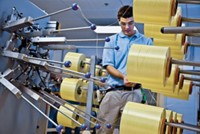Advertisement
Grab your lab coat. Let's get started
Welcome!
Welcome!
Create an account below to get 6 C&EN articles per month, receive newsletters and more - all free.
It seems this is your first time logging in online. Please enter the following information to continue.
As an ACS member you automatically get access to this site. All we need is few more details to create your reading experience.
Not you? Sign in with a different account.
Not you? Sign in with a different account.
ERROR 1
ERROR 1
ERROR 2
ERROR 2
ERROR 2
ERROR 2
ERROR 2
Password and Confirm password must match.
If you have an ACS member number, please enter it here so we can link this account to your membership. (optional)
ERROR 2
ACS values your privacy. By submitting your information, you are gaining access to C&EN and subscribing to our weekly newsletter. We use the information you provide to make your reading experience better, and we will never sell your data to third party members.
Policy
Former Lubrizol Researcher Is Charged
Employee is accused of selling technology to competitor
by Melody Voith
April 7, 2008
| A version of this story appeared in
Volume 86, Issue 14

AFTER AN INTERNAL investigation at specialty chemical maker Lubrizol, federal authorities have charged a former company employee with theft of trade secrets and conspiracy. Kyung J. Kim, a one-time senior R&D associate at Lubrizol's Brecksville, Ohio, facility, is accused of selling confidential company information to SK Chemicals of South Korea.
According to charging documents filed in U.S. District Court for the Northern District of Ohio, Kim allegedly downloaded Lubrizol trade secrets about thermoplastic polyurethanes (TPUs) and other technologies—including nonhalogen flame retardants and static control technology—and provided the information to three co-conspirators. SK Chemicals, a Lubrizol competitor, sells TPUs under the trade name Skythane.
The documents allege that between 2001 and 2007, Kim met at least 17 times with SK Chemicals executives to discuss confidential technology in exchange for cash payments. At each meeting, Kim allegedly received $10,000 in $100 bills and about $1,100 in travel expenses.
In a statement, Lubrizol says it stands by its security measures including limited access to databases, password controls, and encryption. "Unfortunately," it adds, "it is clear that these policies and protective measures are not totally fail-safe, given human behavior."
Lubrizol notified the FBI of its internal discoveries and subsequently fired Kim. The involvement of the SK Chemicals executives is "under investigation," according to Assistant U.S. Attorney Justin J. Roberts, the prosecutor on the case. SK Chemicals officials could not be reached for comment.
The two counts of theft of trade secrets and one count of conspiracy each carry maximum penalties of 10 years in prison and $250,000 in fines. If Kim is convicted, the court will review his role in the conspiracy and any prior criminal record; most cases result in less than the maximum sentence, according to a Justice Department press release. No date has been set for trial.
Roberts says trade secret cases more commonly affect the technology industry in places like Silicon Valley, but "in northern Ohio our industry is manufacturing, and the law here is the same."



Join the conversation
Contact the reporter
Submit a Letter to the Editor for publication
Engage with us on Twitter